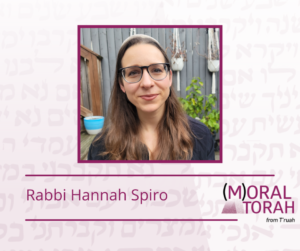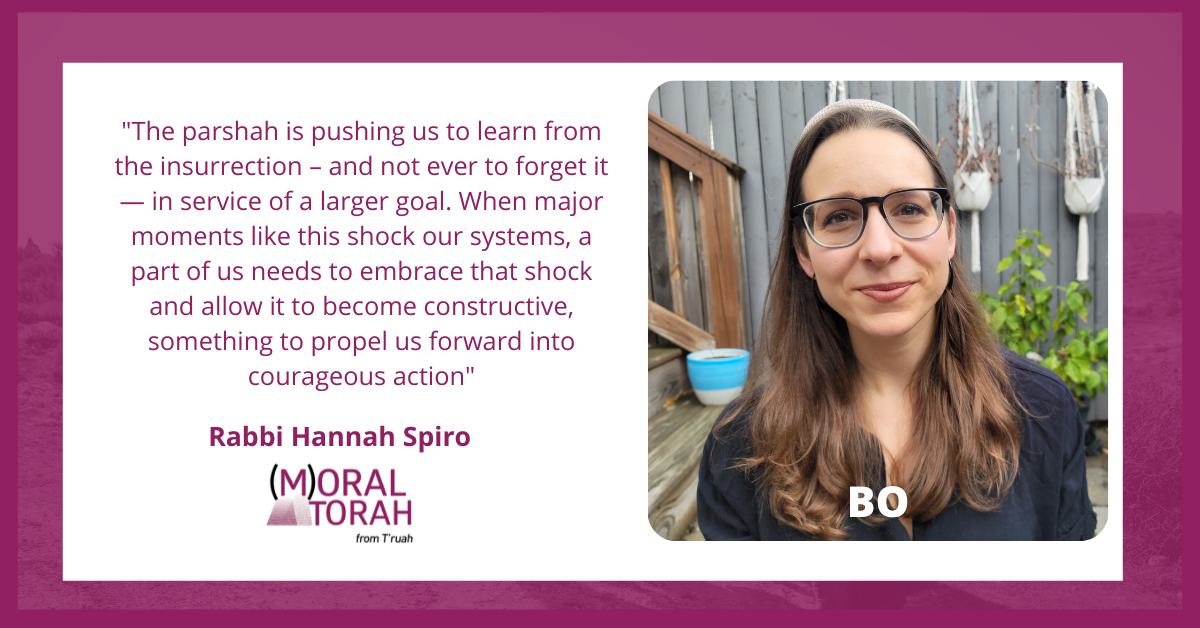A D’var Torah for Parshat Bo by Rabbi Hannah Spiro
It’s not every day (thankfully) that I’m texting my congregants to see if they’re working from home, or if they’re barricaded in their offices trying to avoid armed insurrectionists. It’s not every day (thankfully) that my congregants are fleeing town upon seeing Auschwitz-romanticizing, machine gun-hyping rioters gathering right outside their still-Chanukah-decorated rowhouses. It’s not every day (or is it?) that we’re forced to wonder, as Americans, about the safety and viability of our democracy. But apparently, it is some days – or at least one day, one year ago, on January 6, 2021.
It’s become clearer and clearer over the course of the past year that what happened on January 6 was on purpose, not just for the people who stormed the Capitol but for many others who allowed it to happen and even encouraged it. As we watched, horrified, on Twitter, folks who love to talk about law and order crawled through windows and stormed through doors to, basically, desecrate the Capitol in an act of chaos and violence. I can never forget the video of rioters dragging a police officer through the crowd and beating him underneath a “Blue Lives Matter” flag.
How?!
Sign up to receive (M)oral Torah in your inbox each week.
This week’s parshah, Bo, hints at an answer. It tells the story of the last of the plagues, and begins with God’s statement:
I have hardened [Pharaoh’s] heart and the hearts of his courtiers, in order that I might display My signs among them, and that you may recount in the hearing of your child and of your child’s child how I made a mockery of the Egyptians and how I displayed My signs among them—in order that you may know that I am God. (Exodus 10:1-2)
The text seems to be making two claims about the world: Some people’s hearts are hardened (by God? their upbringing? the media they’ve taken in? their own unique biochemistry?) so that they take incredibly violent, hateful actions. That hardening is terrible, but not for nothing – the terror of those actions is supposed to allow for some sort of divine counter-action and rectification of a larger situation.
In the Talmud, Rabbi Elazar bar Avina has a hot take that feels relevant here. He says that “Calamity befalls the world only due to the Jewish people,” so that the Jewish people will “fear [God] and receive correction” (Yevamot 63a, quoting Zephaniah 3:6-7). When bad things happen, according to Rabbi Elazar, it’s so that we Jews can change our own ways. It’s a self-centered perspective, for sure. It could also be read as pretty brutal victim-blaming. Here’s how I’m interpreting and finding meaning in it, though: When disaster strikes, and human beings do terrible things, it pushes us (Jews, or anyone really) to engage in some reflection and make some teshuvah (repentance) ourselves. I’m moved by the idea that when people act with violence, oppression, and corruption, the tragedies and horrors that ensue provide an opportunity for all thoughtful people to reflect and to commit to doing better.
Find more commentaries on Bo.
With the chaos, trauma, and loss of January 6, 2021, a sign rose up that even those most fearful of ruffling feathers could not ignore. Folks in my community who have always wanted to avoid the “political” suddenly became palpably more concerned with the threats that came to light during the insurrection. Folks I’d heard talk about wanting to keep politics out of religion started demonstrating a real openness to engaging in justice issues as part of Jewish community. January 6 painted in front of us a Venn diagram of politics, ethics, and basic human health that was, quite clearly, a near perfect circle. Here on the Hill, with the massive new barricades around the Capitol Building cutting through our regular drives, walks, and jogs, certain issues could not be ignored. Nobody could walk by those barricades in the wake of January 6 and feel total apathy. We had to grapple with a healthy fear and awe of God and God’s creation, and we had to receive correction.
No loss of life is worth that awakening – not the officer who was killed by the insurrectionists, nor the traumatized officers who died by suicide in the aftermath, nor even the people whose hearts were hardened somewhere between their births and their deaths during their own insurrection. No loss of life was worth our reality check.
 But when hearts are hardened and a plague hits, the Torah teachesus that we have to take that plague as a sign. The parshah is pushing us to learn from the insurrection – and not ever to forget it — in service of a larger goal. When major moments like this shock our systems, a part of us needs to embrace that shock and allow it to become constructive, something to propel us forward into courageous action. The Israelites who lived through the plagues had no choice but to boldly live their lives in pursuit of a new future, free of oppression, and full of opportunity for all. I’m grateful to be part of a generation that is forced to do the same.
But when hearts are hardened and a plague hits, the Torah teachesus that we have to take that plague as a sign. The parshah is pushing us to learn from the insurrection – and not ever to forget it — in service of a larger goal. When major moments like this shock our systems, a part of us needs to embrace that shock and allow it to become constructive, something to propel us forward into courageous action. The Israelites who lived through the plagues had no choice but to boldly live their lives in pursuit of a new future, free of oppression, and full of opportunity for all. I’m grateful to be part of a generation that is forced to do the same.
Rabbi Hannah Spiro, a DC-area native and 2017 RRC grad, is the rabbi of Hill Havurah, an independent congregation on Capitol Hill. When she’s not serving her congregation, you can find Hannah parenting two little ones with her spouse in Northeast DC, trying to get a workout in, learning daf yomi, and watching Survivor. Follow @hannah18spiro on twitter.


